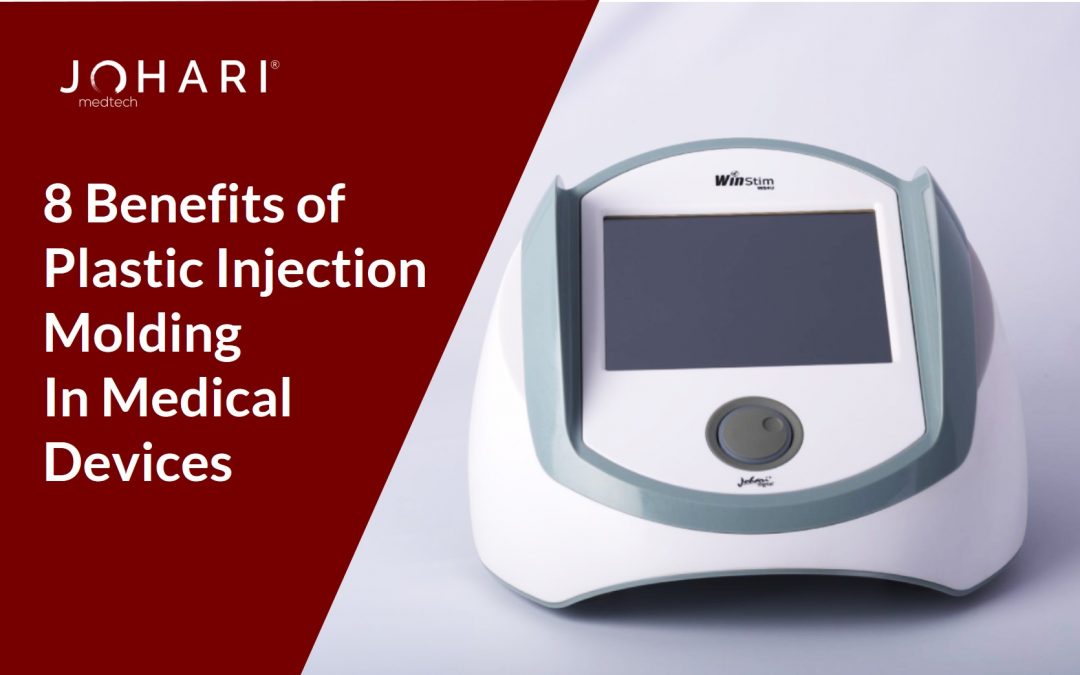Finalizing the technique to use while designing medical device parts & enclosures is tough. At our premises, we play around with many techniques to design sturdy and medical-grade enclosures.
One of the in-trend techniques for designing medical grade enclosures/devices is Plastic Injection Molding.
The technique optimizes the cost of manufacturing without compromising the quality and volume of production. The components designed using IM meet industry specifications and regulatory requirements of medical device manufacturing & approval.
Key Benefits of using injection molding for manufacturing
If you are looking for a perfect technique for durable, sterilization friendly, and high-volume production with maximum accuracy then Plastic Injection Molding is the one for you.
Here we have listed key benefits for choosing Plastic Injection Molding for your medical device manufacturing:
1. Customization
Plastic injection molding technique is being widely used in medical device manufacturing to realize the envisioned product design. The process offers a wide range of customization, an array of undercuts, internal & external threads and custom colors.
- Enclosure Design
- Component Design
- Housing and casings for equipment.
- Medical Knobs
- Wearable healthcare Technology
2. Cost-optimization
In cases of large volume production, it’s necessary to keep the cost factor in mind. Injection molding is the best way to optimize cost in bulk manufacturing. Large bulky designs can be made more compact and cost-efficient using plastic injection molding.
3. Exceptional accuracy
Medical manufacturing is a critical task. A minor glitch can cost lives or millions. Injection molding is perfect to manufacture quality & quantity of medical device components. The technique offers exceptional accuracy & precision.
4. Material Selection
Medical devices use materials including silicone, polycarbonate, polyethylene, and polypropylene. These all come under the category of plastics. But, the condition of their usage depends on device application.
There are numerous benefits of using light-volume material in medical devices. Medical grade Plastics must ensure biocompatibility, ease of handling, sturdiness, and quality of the product. Plastics offer a wide range of benefits over others. With plastic-based components, Manufacturers can maintain speed, quality, quantity, and cost all at once.
There are several types of plastics in medical device manufacturing:
Silicone
At several places, the flexibility of components and parts is the priority. Silicone is the best-suited material in material for flexible parts processing.
Polypropylene
Polypropylene is a perfect fit for devices that require multiple autoclaving. The material also exhibits exceptional radiation resistance.
Polycarbonate
Most aptly suited for impact and vibration resistance. The devices where transparency is a priority, polycarbonate is the perfect material to use. The material also offers high resistance to UV light and heat.
Polyethylene
Polyethylene is a perfect material for sturdy gadgets requiring daily usage or exposure. Wearables & Hand-held healthcare products are manufactured using this material.
5. Durability
The enclosures or parts designed using injection molding are resistant to vibration, harsh environment & blunt force. These can withstand tough conditions without breaking, cracking, or shattering.
6. Sterilization
The injection molding devices comply with US FDA guidelines. The process makes them suitable to withstand the sterilization process. The devices using this technology are biocompatible, non-contaminated [easy sterilization], and safe to operate & apply.
7. Product Development Time
Manufacturers employing injection molding can reduce the overall time. Curtailed timeline of product development and minimal scope of errors make this a perfect technique for Medical Device Manufacturing. Adopting Injection Molding for manufacturing ensures OEMs’ competitive advantage in the segment.
8. FDA Regulations & ISO Certification
FDA regulations are a priority for all medical device manufacturers. Plastic Injection Molding enhances sterilization, strength, durability and ease of handling. The controlled nature of Injection Molding makes it easier to comply with ISO & FDA regulatory standards.

